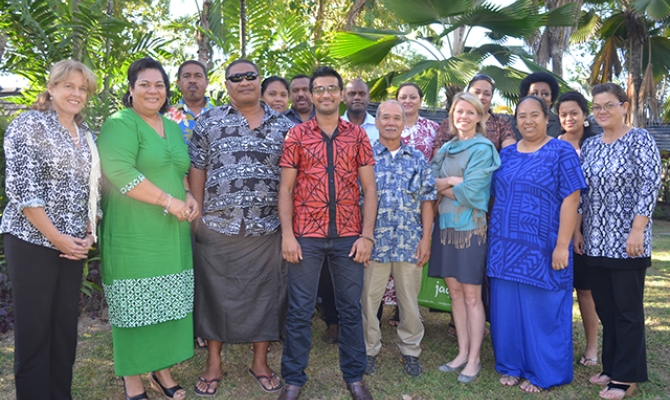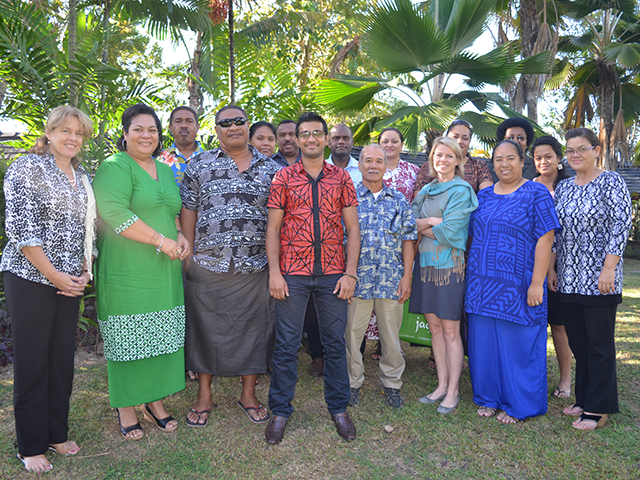
Climate Change Resilience
Representatives from eightdifferent Pacific island countries have gathered today in Nadi, Fiji to attend the Multipartite Review (MPR) for the Pacific Islands Greenhouse Gas Abatement through Renewable Energy Project (PIGGAREP).
This will be the final MPR meeting for PIGGAREP which is wrapping up in December after six and a half years of working to remove barriers to the uptake of renewable energy technologies across fourteen Pacific island countries and territories - thus reducing the reliance on fossil fuel and reducing greenhouse gas emissions.

Of particular interest at this meeting, which runs over three days, will be the critical review and discussion of a report detailing current and projected greenhouse gas emissions against the PIGGAREP targets, set at the inception of the project in 2007.
In her opening remarks, Dr. Netatua Pelesikoti, Director of the Climate Change Division at the Secretariat of the Pacific Regional Environment Programme (SPREP), touched on the topic of why it's important for the Pacific region to reduce their greenhouse gas emission rates when they are already relatively small:
"While on a global scale, the level of greenhouse gas emissions of Pacific island countries and territories is not statistically significant, it must be remembered that reducing greenhouse gas emissions is a very important development objective. Also, on a symbolic level, a collective commitment to reducing greenhouse gas emissions sends a clear message that island nations are treating climate change with the seriousness which it deserves."
The event will also provide the important opportunity to capture the vital knowledge and experience from the skilled team of PIGGAREP Coordinators to ensure that lessons learned from PIGGAREP can be passed on to others in the future.
Also speaking at the opening of the MPR meeting today, Ms. Lizbeth Cullity, Resident Representative of the United Nations Development Programme (UNDP), Samoa Multi Country Office talked about the importance of using the opportunity of the MPR to be rigorous about gathering information and lessons learned:
"It's so important that we dedicate time to looking at the building blocks that have been laid through PIGGAREP and examine them critically so that this work can pave the way for future activities to support island nations to transition to low carbon economies."
PIGGAREP is a Global Environment Facility (GEF) funded regional project being implemented by UNDP (through the UNDP Samoa Multi Country Office) with SPREP as the implementing partner.
Also to be discussed at the MPR will be the progress of two extension projects known as PIGGAREP+. These initiatives, building on the successes of PIGGAREP, have seen additional funding allocated for solar power, bioenergy and biofuel activities in , Cook Islands, Samoa and Kiribati respectively. The funds to help support these activities have been made possible through the SIDS DOCK Support Program, a joint initiative of the UNDP and the World Bank, developed in close consultation with the Alliance of Small Island States and funded by the Government of Denmark.
This will be the final MPR meeting for PIGGAREP which is wrapping up in December after six and a half years of working to remove barriers to the uptake of renewable energy technologies across fourteen Pacific island countries and territories - thus reducing the reliance on fossil fuel and reducing greenhouse gas emissions.

Of particular interest at this meeting, which runs over three days, will be the critical review and discussion of a report detailing current and projected greenhouse gas emissions against the PIGGAREP targets, set at the inception of the project in 2007.
In her opening remarks, Dr. Netatua Pelesikoti, Director of the Climate Change Division at the Secretariat of the Pacific Regional Environment Programme (SPREP), touched on the topic of why it's important for the Pacific region to reduce their greenhouse gas emission rates when they are already relatively small:
"While on a global scale, the level of greenhouse gas emissions of Pacific island countries and territories is not statistically significant, it must be remembered that reducing greenhouse gas emissions is a very important development objective. Also, on a symbolic level, a collective commitment to reducing greenhouse gas emissions sends a clear message that island nations are treating climate change with the seriousness which it deserves."
The event will also provide the important opportunity to capture the vital knowledge and experience from the skilled team of PIGGAREP Coordinators to ensure that lessons learned from PIGGAREP can be passed on to others in the future.
Also speaking at the opening of the MPR meeting today, Ms. Lizbeth Cullity, Resident Representative of the United Nations Development Programme (UNDP), Samoa Multi Country Office talked about the importance of using the opportunity of the MPR to be rigorous about gathering information and lessons learned:
"It's so important that we dedicate time to looking at the building blocks that have been laid through PIGGAREP and examine them critically so that this work can pave the way for future activities to support island nations to transition to low carbon economies."
PIGGAREP is a Global Environment Facility (GEF) funded regional project being implemented by UNDP (through the UNDP Samoa Multi Country Office) with SPREP as the implementing partner.
Also to be discussed at the MPR will be the progress of two extension projects known as PIGGAREP+. These initiatives, building on the successes of PIGGAREP, have seen additional funding allocated for solar power, bioenergy and biofuel activities in , Cook Islands, Samoa and Kiribati respectively. The funds to help support these activities have been made possible through the SIDS DOCK Support Program, a joint initiative of the UNDP and the World Bank, developed in close consultation with the Alliance of Small Island States and funded by the Government of Denmark.